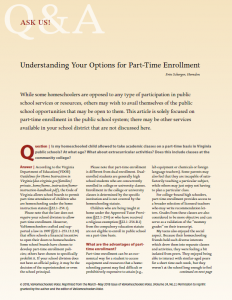Homeschoolers' Access to Public School Classes
The March-May 2018 issue of VaHomeschoolers Voice magazine contains the article entitled “Understanding Your Options for Part-Time Enrollment” to answer many of your questions about homeschoolers’ access to the public schools.
While some homeschoolers are personally opposed to part-time enrollment in public school classes or activities, other homeschoolers appreciate the flexibility and additional choices that public school access provides their families. Following are some frequently asked questions and answers regarding public school access and homeschooling in Virginia.
The Organization of Virginia Homeschoolers appreciates input from our members about how public school access is working or not working in different regions of the Commonwealth. We also appreciate your information about new access initiatives in your local school division. Please send your reports and stories about homeschooler access to VaHomeschoolers. Thanks so much for your help with this ongoing effort.
Virginia law allows local school boards to count home instructed and private school students who attend public schools on a part-time basis in the Average Daily Membership (ADM) count for school funding. This law, crafted and supported by The Organization of Virginia Homeschoolers in 1997, offers a strong financial incentive for schools to allow part-time enrollment of homeschoolers. To read the law:
Frequently Asked Questions
Is my homeschooled child allowed to take classes part-time in Virginia public schools?
Your child may be allowed to enroll in classes in the public schools on a part-time basis. However, Virginia law does not require school divisions to open their doors to homeschoolers. Some local school boards have chosen to develop part-time enrollment policies, while others have policies which strictly prohibit part-time enrollment by homeschoolers.
If your school division does not have an official policy, decisions about part-time enrollment are the prerogative of the superintendent or local principal. For more information about finding your school division’s local policies, see Know Your School Division Policy.
How is part-time access working in the Virginia counties which have official access programs?
Homeschooling families and public school officials appear to be very pleased with how access policies are working across the commonwealth. Families who have tried part-time access appreciate having more educational options for their children, and schools with part-time access policies appreciate the extra money.
To the best of VaHomeschoolers’ knowledge, part-time access in these school divisions has not led to additional regulation of homeschoolers, nor has it led to homeschoolers being forced to take unwanted classes or receive unwanted counseling.
How many Virginia school divisions currently offer part-time enrollment?
The most recent VaHomeschoolers’ School Division Policy Review (August 2017) found that 66 of the 132 school divisions permit homeschooled students to take classes on a part-time basis.
The 2011 VaHomeschoolers’ School Division Policy Review had similar findings.
Some critics of access have argued that part-time enrollment of homeschoolers will lead to further overcrowding of public school classes. Is this true?
Because requests for courses are granted on a space-available basis, part-time students do not take classroom space away from public school children. According to the responses to our annual membership survey, the number of homeschoolers using part-time access remains small. School divisions with official access programs have reported that fewer than one percent of the homeschoolers in their communities have chosen to attend public school classes part-time.
Can my homeschooled child participate in public school sports?
Public school interscholastic competitive sports are controlled by the Virginia High School League (VHSL). VHSL’s “individual eligibility regulations” require that student athletes must have taken and passed five courses at the participating school during the past semester, and be enrolled in five courses during the current semester. Local school divisions must adhere to the VHSL eligibility guidelines in order not to jeopardize their league participation. To read more about VHSL’s regulations, see VHSL’s Rules and Regulations Handbook (Section 28)
In addition to interscholastic competitive sports, VHSL eligibility guidelines also apply to several other high school interscholastic extracurricular activities, including debate and forensics teams, creative writing competitions, etc. VHSL has no dominion over physical education classes or sports activities that are not interscholastic (such as an after-school recreational sports club or an intramural sport). These classes and activities are governed by policies of the local school board, or, in the absence of a board policy, by the superintendent or the local principal.
For more information about the ongoing issue of homeschoolers and sports access, see Sports Access.
Can my homeschooled child participate in extracurricular activities or special programs in the public schools?
Your child may be able to participate in many public school clubs, special programs (such as those for gifted children), and after-school activities, as long as they are not governed by the VHSL eligibility guidelines. Some school divisions with part-time enrollment policies also allow homeschoolers to participate in some extracurricular activities. In other communities, some homeschooling families have worked out private arrangements with their local public schools so their children could participate in clubs and after school activities.
According to the Virginia Department of Education Handbook on Home Instruction in Virginia, the local school board sets the policies for access to public school extracurricular activities and special programs, such as those for gifted children. In the absence of an official school division policy, access to extracurricular activities or special programs remains the prerogative of the local superintendent or principal. Local policies can be changed through parental advocacy at the local level. VaHomeschoolers is happy to assist parents with local advocacy efforts. Please email Government Affairs.
I have a special needs child who qualifies for therapy. Can he have access to special education or services through the public schools?
Much of the following information is based on information contained in pages 35-36 of the Virginia Department of Education’s 2010 manual Parent’s Guide to Special Education.
Your child may be eligible for certain special services through your local public school system. Under the Federal Individuals with Disabilities Education Act (IDEA), children with disabilities are entitled to a free appropriate public education designed to meet their individual needs, according to the child’s individualized education program (IEP).
However, according to the Virginia Department of Education’s interpretation of IDEA, while the public schools are required to identify and evaluate homeschooled children with disabilities, “homeschooled children are not entitled to receive some or all of the special education and related services” that children enrolled in public schools would receive.
The public schools are not required to pay for the cost of educating your child if the school made a free and appropriate public education available to you before you chose to homeschool. They are required to have a formal plan for how nonpublic students are to receive special services (if any). Each special education case is unique, and your child’s eligibility for services may vary depending on your child’s particular needs, the funding situation in your county, the policies of your local school board regarding special education and services, and the individuals in your county’s special education program.
As a homeschooling parent, you have the right to request a due process hearing regarding “child find procedures” (the procedures for identifying and evaluating children for special education services). You also have the right to file a written complaint if you believe the school division violated the law regarding the provision of services to your child. Another right you have as a parent is the right to refuse evaluation or re-evaluation of your special needs child, with the understanding that doing so may affect your child’s eligibility for services.
Some homeschooling families have established positive working relationships with their local special education program, while other families have found it easier to meet their needs outside the public schools. Some homeschoolers have also worked out private arrangements with individual public school teachers or therapists. It may be helpful to talk with other families of special needs children in your community to learn more about your local options.
Are the “virtual schools” which offer homeschooling curriculum through the public schools considered “access programs”?
The “virtual learning academies” in certain Virginia counties are public school programs, not homeschooling access programs. Children who enroll in these programs full time are considered public school students for accountability and other purposes.
In addition to the “virtual learning academies,” there are a growing number of online high school coursework opportunities offered by both the Virginia Department of Education and various school divisions across the state. Some of these opportunities are available to homeschooled students as well.
The 2010 passage of HB 1388 and SB 738 in the Virginia General Assembly paved the way for new laws and regulations for virtual schools and courses. This may have implications for homeschooling families who choose to use these public school resources. For more information about virtual learning academies, see K12, Inc. and “Virtual Learning Academies”
What is VaHomeschoolers doing about homeschool access issues?
The Organization of Virginia Homeschoolers works at the state and local levels to craft more effective homeschool access laws and policies for parents and policymakers alike. Over the years, we have lobbied for access legislation in the Virginia General Assembly, helped school divisions improve their access policies, helped parents successfully resolve access concerns, and dialogued repeatedly with the Virginia Department of Education (VDOE), the Virginia High School League (VHSL), the Virginia School Board Association (VSBA), and numerous local school boards on various access issues.
This information is provided as a courtesy of The Organization of Virginia Homeschoolers. It is not intended as legal advice. For legal advice, contact a licensed attorney.
VaHomeschoolers is a non-profit public charity with 501(c)(3) status; your donation is tax-deductible to the extent provided by law.

